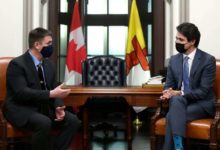New clinic at CHEO to address specific needs of Inuit patients
Young patients from the Nunavut coming to CHEO to be treated for complicated health issues will now have a clinic just for them.
The new Aakuluk Clinic — “aakuluk” is an Inuktitut term expressing warmth, love and affection — will serve as a hub for young patients and their families coming to Ottawa from Nunavut for long periods of time to receive specialized care.
“Inuit families are far from their homes, communities and culture, while trying to navigate some fairly complex health-care needs,” said Radha Jetty, a CHEO pediatrician and medical lead at the new clinic who lived and worked in Nunavut for four years.
Families will be greeted by Inuit patient navigators from the Inuuqatigiit Centre for Inuit Children Youth and Tungasuvvingat Inuit. A team will co-ordinate tests and appointments with specialists, and will facilitate access to translation services.
Every Monday, CHEO pediatricians with expertise in northern health will meet with staff who are treating the needs of young Nunavummiut patients.
The clinic was developed following the wisdom and guidance of Inuit community partners.
“It’s great,” said Stephanie Mikki Adams, executive director of the Inuuqatigiit Centre for Inuit Children, Youth and Families. “This new clinic will provide a culturally safe space for families to access the care they need for their children.”
Unique challenges, tough decisions
According to CHEO, during the last fiscal year, 2,200 patients from Nunavut came through its doors, and the numbers are on the rise.
Medical evacuations from Nunavut have increased by 38 per cent in the last two years. Over the last three years, admissions medical and surgical wards are up by 50 per cent, as are visits to the emergency department and medical day unit.
Admissions to intensive care are also increasing.
The patients the clinic are supporting are the ones who face months or even years of hospitalization, or require ongoing treatment, like Joavee Aliviktuk’s grandson.
Aliviktuk lives in Pangirtung, Nunvut, and speaking Inuktitut on Monday, described the seriousness of his grandson’s illness.
Finding the balance
“They’re having to travel so far to access care, and in some instances to a place where there’s a different culture and a different language,” said Jetty. “Sometimes families or parents have to stop working [to stay with their child], and they don’t have means of continuing to have a source of income.”
She particularly remembers one little girl who was diagnosed with a severe immunodeficiency, or a weakened immune system, shortly after she was born and couldn’t return home for years because she was too fragile.
“We really struggled with finding that balance of trying to prioritize her safety by keeping her isolated here in the south with the priority of keeping her connected with her family,” she said. “We sometimes have to bring in a bio-ethicist to help us with those decision.”
It will take some time before CHEO knows how successful the clinic will be. The plan is to have an evaluation process to collect information to find out how much it’s helping.
“Ultimately it’s our families who need to tell us whether the clinic is is working or not,” she said.
CBC








Redes Sociais - Comentários